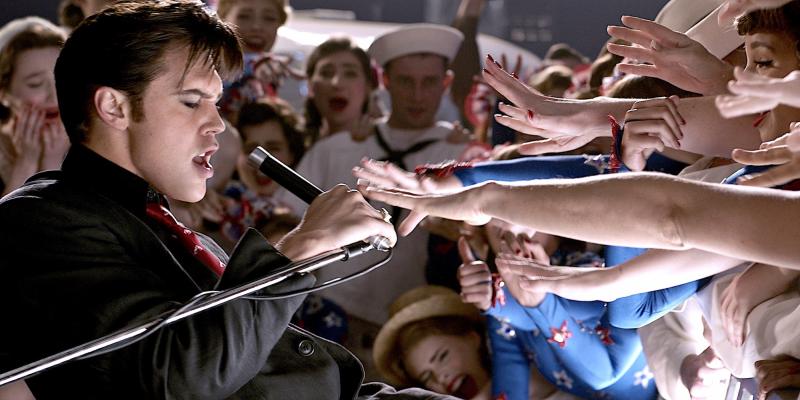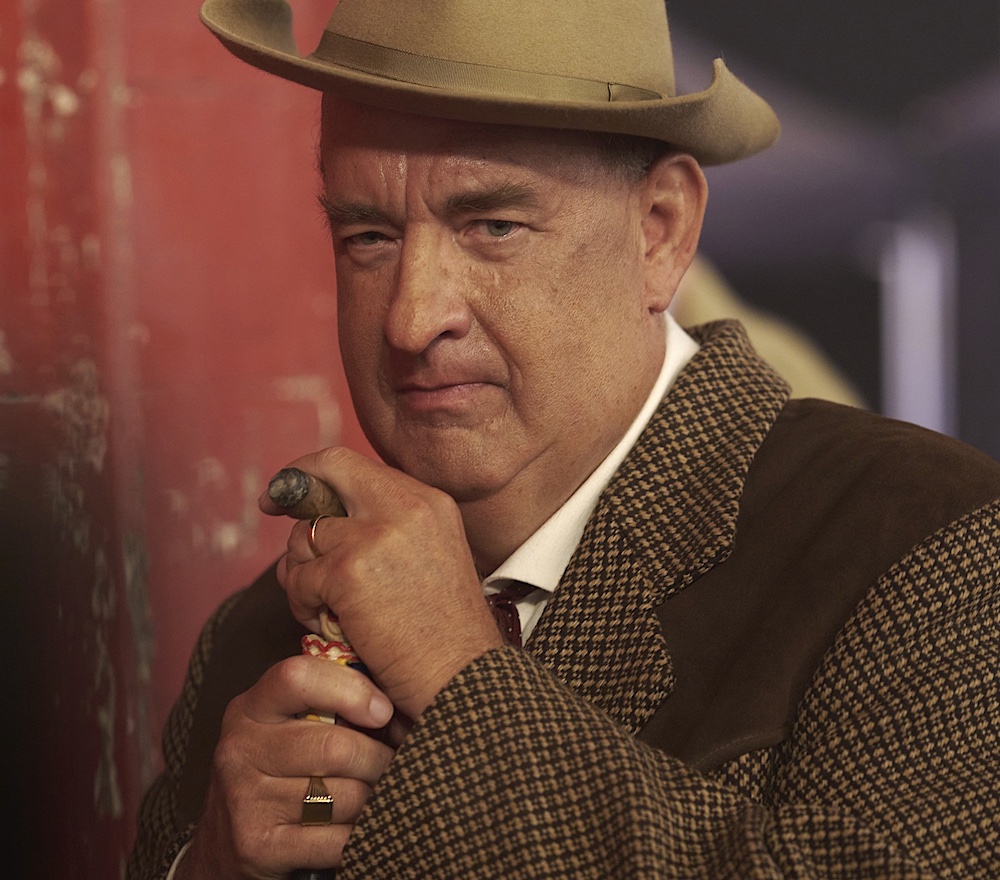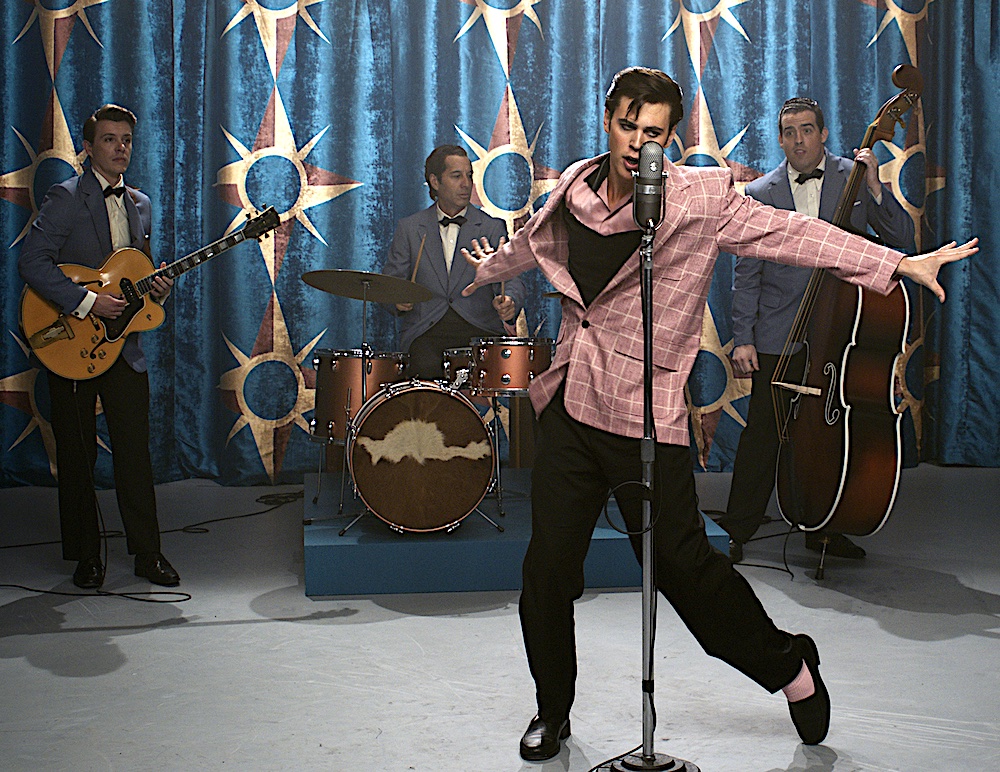Elvis review - Austin Butler shines in patchy biopic | reviews, news & interviews
Elvis review - Austin Butler shines in patchy biopic
Elvis review - Austin Butler shines in patchy biopic
Baz Luhrmann's portrait of the King doesn't cut below the surface

Strictly Ballroom aside, I’ve never been entirely persuaded by Baz Luhrmann. Once you rip open the plush packaging of his films, you often just find satin and tissue paper inside. Elvis isn’t his worst movie (they can’t take that accolade away from Moulin Rouge!) but it isn’t the monumental ode to a great American legend that one hoped it might have been.
Hats off to Luhrmann’s leading man Austin Butler, at least, who makes a heroic stab at stepping into Elvis’s blue suede shoes and Las Vegas jumpsuits. He doesn’t really resemble the King, but with help from lighting, makeup and some jittery, rubbery shimmers and wiggles, there are several occasions where, just for an instant, you’re convinced you’re looking at the real thing in living, breathing motion. It’s his voice you hear singing some of Elvis’s early songs too, quite convincingly.
 Among the snags with making a film about Presley must be trying to decide where you’re going to draw your boundaries, since his story encompasses so many aspects of post-World War II American history and culture. They may have called him the King of Rock’n’ Roll, but eventually he became his own unique species, an inspiration to many an aspiring performer but in the end nothing really to do with rock ’n’ roll at all, even if everyone from Tom Jones to Bob Dylan to Led Zeppelin trooped dutifully up to his hotel suite to pay homage.
Among the snags with making a film about Presley must be trying to decide where you’re going to draw your boundaries, since his story encompasses so many aspects of post-World War II American history and culture. They may have called him the King of Rock’n’ Roll, but eventually he became his own unique species, an inspiration to many an aspiring performer but in the end nothing really to do with rock ’n’ roll at all, even if everyone from Tom Jones to Bob Dylan to Led Zeppelin trooped dutifully up to his hotel suite to pay homage.
Luhrmann has opted to try to cram everything from cradle to grave into his film, but even with a running time of 159 minutes it’s not possible to keep all the moving parts in balance. Elvis’s early years in primitive Tupelo, Mississippi are rendered like a sepia-tinted reverie, as we see the young country boy finding early inspiration from a rapturous revival meeting in a big tent. His roots in black music are affirmed by encounters with a young BB King, Big Mama Thornton, and Little Richard – the latter brilliantly impersonated by Alton Mason, pictured above, who deserved more screen time – while his a-reelin’ and a-rockin’ stage movements provoke shrieking hysteria and impure thoughts among the sheltered womenfolk of the mid-Fifties.
However, while his stint in the US Army is covered, as well as his post-Army career in movies, there’s a sudden leap to 1968 and the famous TV “Comeback Special”, starring a black-leathered Elvis. But since the extent of Elvis’s decline hasn’t been spelled out, it isn’t clear what he’s supposed to be coming back from. What is evident, though, is that he wants to make his own choices and not pad his TV special out with crass Yuletide shlock, as his manager Colonel Tom Parker wants him to.
 Parker (a puffy-faced Tom Hanks, pictured right in a role which jars uncomfortably with his Mr Agreeable persona), was the fairground hustler and con artist who indubitably helped to make his boy Elvis the “greatest show on earth”. Unfortunately, he also killed the golden goose by stuffing him into a list of gruesomely mediocre films – even if he did make Elvis Hollywood’s best paid actor for a time – and chaining him to the tacky Vegas treadmill until the King became a tragic parody of his former glories.
Parker (a puffy-faced Tom Hanks, pictured right in a role which jars uncomfortably with his Mr Agreeable persona), was the fairground hustler and con artist who indubitably helped to make his boy Elvis the “greatest show on earth”. Unfortunately, he also killed the golden goose by stuffing him into a list of gruesomely mediocre films – even if he did make Elvis Hollywood’s best paid actor for a time – and chaining him to the tacky Vegas treadmill until the King became a tragic parody of his former glories.
It looks for a while as if Luhrmann intends to show the whole Elvis story through Parker’s eyes, which wouldn’t have been a bad idea if it was Martin Scorsese shooting it like Casino 2, but Luhrmann’s approach is more of a tabloidy scenes-from-a-life than a bare-knuckle drama. It never cuts below the surface, and remains frustratingly vague about Elvis’s “Memphis Mafia” buddies and his musical partners, who are little more than ciphers. Olivia DeJonge is given little space in which to explore the enigma of Priscilla Presley.
Parker is relegated to a lingering irritant who somehow Elvis can never shake off. Quite how he managed to maintain such complete control of his client, while he systematically creamed off a vast percentage of the profits and used Elvis as a bargaining chip against which to write off his obscene gambling debts, is not explained. However, the stuff about how Parker wouldn’t allow Elvis to tour outside the USA because he was an illegal immigrant from Holland without a US passport is true enough.
 There’s still enough of a fascinating story here to paper over some of the film’s shortcomings, and it conveys something of Presley’s musical and personal magnetism, but it should have been more than this. It won’t do Austin Butler any harm, though.
There’s still enough of a fascinating story here to paper over some of the film’s shortcomings, and it conveys something of Presley’s musical and personal magnetism, but it should have been more than this. It won’t do Austin Butler any harm, though.
The future of Arts Journalism
You can stop theartsdesk.com closing!
We urgently need financing to survive. Our fundraising drive has thus far raised £49,000 but we need to reach £100,000 or we will be forced to close. Please contribute here: https://gofund.me/c3f6033d
And if you can forward this information to anyone who might assist, we’d be grateful.

Subscribe to theartsdesk.com
Thank you for continuing to read our work on theartsdesk.com. For unlimited access to every article in its entirety, including our archive of more than 15,000 pieces, we're asking for £5 per month or £40 per year. We feel it's a very good deal, and hope you do too.
To take a subscription now simply click here.
And if you're looking for that extra gift for a friend or family member, why not treat them to a theartsdesk.com gift subscription?
more Film
 Blu-ray: Finis Terrae
Bleak but compelling semi-documentary, filmed on location in Brittany
Blu-ray: Finis Terrae
Bleak but compelling semi-documentary, filmed on location in Brittany
 Oslo Stories Trilogy: Sex review - sexual identity slips, hurts and heals
A quietly visionary series concludes with two chimney sweeps' awkward sexual liberation
Oslo Stories Trilogy: Sex review - sexual identity slips, hurts and heals
A quietly visionary series concludes with two chimney sweeps' awkward sexual liberation
 Sorry, Baby review - the healing power of friendship in the aftermath of sexual assault
Eva Victor writes, directs and stars in their endearing debut feature
Sorry, Baby review - the healing power of friendship in the aftermath of sexual assault
Eva Victor writes, directs and stars in their endearing debut feature
 Blu-ray: Who Wants to Kill Jessie?
Fast-paced and visually inventive Czech comedy
Blu-ray: Who Wants to Kill Jessie?
Fast-paced and visually inventive Czech comedy
 Oslo Stories Trilogy: Love review - freed love
Gay cruising offers straight female lessons in a heady ode to urban connection
Oslo Stories Trilogy: Love review - freed love
Gay cruising offers straight female lessons in a heady ode to urban connection
 Beating Hearts review - kiss kiss, slam slam
Romance and clobberings in a so-so French melodrama
Beating Hearts review - kiss kiss, slam slam
Romance and clobberings in a so-so French melodrama
 Materialists review - a misfiring romcom or an undercooked satire?
Writer-director Celine Song's latest can't decide what kind of film it is
Materialists review - a misfiring romcom or an undercooked satire?
Writer-director Celine Song's latest can't decide what kind of film it is
 theartsdesk Q&A: actor Leonie Benesch on playing an overburdened nurse in the Swiss drama 'Late Shift'
The Guildhall-trained German star talks about the enormous pressures placed on nurses and her admiration for British films and TV
theartsdesk Q&A: actor Leonie Benesch on playing an overburdened nurse in the Swiss drama 'Late Shift'
The Guildhall-trained German star talks about the enormous pressures placed on nurses and her admiration for British films and TV
 Freakier Friday review - body-swapping gone ballistic
Lindsay Lohan and Jamie Lee Curtis's comedy sequel jumbles up more than their daughter-mother duo
Freakier Friday review - body-swapping gone ballistic
Lindsay Lohan and Jamie Lee Curtis's comedy sequel jumbles up more than their daughter-mother duo
 Eight Postcards from Utopia review - ads from the era when 1990s Romania embraced capitalism
Radu Jude's documentary is a mad montage of cheesy TV commercials
Eight Postcards from Utopia review - ads from the era when 1990s Romania embraced capitalism
Radu Jude's documentary is a mad montage of cheesy TV commercials
 The Kingdom review - coming of age as the body count rises
A teen belatedly bonds with her mysterious dad in an unflinching Corsican mob drama
The Kingdom review - coming of age as the body count rises
A teen belatedly bonds with her mysterious dad in an unflinching Corsican mob drama

Add comment